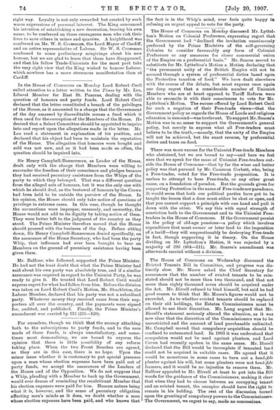Sir Henry Campbell-Bannerman, as Leader of the House, dealt only
with the charge that Members were willing to surrender the freedom of their conscience and pledges because they had received pecuniary assistance from the Whips of the party to which they belonged. That was a different question from the alleged sale of honours, but it was the only one with which he should deal, as the bestowal of honours by the Crown had been held to be outside the purview of the House. In his opinion, the House should only take notice of questions of privilege in extreme cases. In this case, though he thought the accusations were improper, unseemly, and unworthy, the House would not add to its dignity by taking notice of them. They were better left to the judgment of the country as they stood. The Prime Minister therefore moved that the House should proceed with the business of the day. Before sitting down, Sir Henry Campbell-Bannerman denied specifically, on the assurance of the Home Secretary, who had been the party Whip, that influence had ever been brought to bear on Members on the ground of pecuniary assistance having been given them.






































 Previous page
Previous page